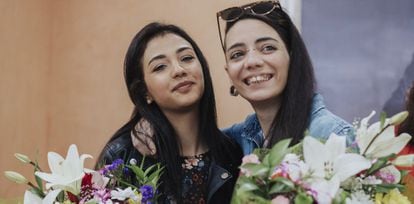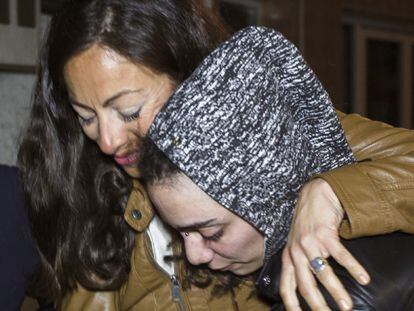Spaniard who went missing in Turkey blames homophobia for her treatment
María Jimena Rico and her girlfriend were held incommunicado after fleeing the latter’s father
It’s been two weeks, during which each step has brought with it “a new emotion and a new fear.” Spaniard María Jimena Rico, and her partner, Egyptian Shaza Ismail, gave a press conference in Spain on Tuesday, where they explained as best they could the ordeal that saw them travel to Dubai, Georgia and Turkey last month, and end up spending three days incommunicado in a detention center in Istanbul. The reason for their unplanned journey was to escape Shaza’s father, who allegedly would not accept the fact that his daughter is homosexual, nor that she was in a relationship with the Spaniard.

The arrest of the couple in Turkey was “apparently” because there had been a report related to terrorism, although at the press conference, Jimena said that she was convinced that it was more to do with homophobia. “Because we are women and lesbians,” she told reporters in Torrox, the village in Malaga where her parents live. “At no time did we hide what we are,” she added. The treatment in Turkey was “unexpected and inhumane,” added Shaza.
After their arrest in Turkey they were forced into signing documents “without knowing what they were”
There are still details to be filled in before the entire episode becomes clear, and on legal advice, the pair cannot explain exactly what happened to them. Ismail is currently in Spain on a temporary visa, but the couple are trying to secure permanent residency for her. One of the arguments for their request is political asylum, based on an alleged risk to her life in Dubai due to her sexual orientation.
The couple explained on Tuesday that they are considering taking legal action, although they are yet to confirm what this would consist of and against whom. According to Jimena, after their arrest in Turkey they were forced into signing documents “without knowing what they were,” while the Spanish embassy in the country had no idea that they had been arrested in Istanbul until her family filed a report with the Civil Guard and the case broke in the Spanish media. Both Jimena and her family only had words of praise for the role played by the Spanish government.
The nightmare began last month. Jimena, 28, and Shaza, 21, have been together since the end of last year. On April 14, the pair flew from London, where they were both living, to Dubai, having allegedly been “duped” by the father of Shaza, who had told her that her mother was very ill. The Egyptian youngster had shortly beforehand told her family that she was gay. Once they arrived in the Emirate, they were greeted with alleged death threats, while Shaza had been reported to the authorities. “I know that her father loves her,” explained Jimena, “but his mind is so closed that he can’t understand [their relationship].”
The girls managed to escape and got as far as Georgia. At the airport in the capital, Tbilisi, they planned to catch a return flight to London, but they were intercepted by Shaza’s father and other members of the family, who wanted to take her back to Dubai. An altercation took place in the airport, in which the police were involved. The authorities then took the two young women to the Turkish border.
It appears they were being monitored, as they were arrested by the Turkish police as soon as they arrived in Samsun
According to Jimena, who has joint Spanish and Argentine nationality, Shaza has two passports (from Egypt and Dubai). Her father is alleged to have “ripped up” the visa that she had giving her permission to live in London. She denied earlier reports that they had entered into Turkey without travel documents. The father of Shaza is alleged to have taken their passports from them, but later they got them back. They both applied for a visa online to enter Turkey, and claim that their situation there was “legal.”
At this point in the story the gaps started to appear, gaps that the couple said they would prefer not to fill in.
They traveled as far as Samsun in Turkey, where they were held for 12 hours, and once they were freed, they took a bus to Istanbul, where they were planning on getting in touch with the Spanish consulate in order to leave the country. But it appears they were being monitored, as they were arrested by the Turkish police as soon as they arrived there. This was on April 24, a Monday, and that was when Jimena’s family lost contact with her and reported her disappearance to the Civil Guard.
Among their plans now that they are in Spain, as well as looking for work, is to get married
Their time in the Turkish detention center is the part where the two women gave fewest details. They were incommunicado for a total of three days, when they were transferred to another building to be deported. Jimena explained that she “stole” a phone from a rucksack (she was apparently “handcuffed”), and managed to get in touch with her sister, María del Valle. The youngster also explained how she had refused to leave for Spain without Shaza. “They called me four times,” she explained on Tuesday. “And I told them that I wasn’t leaving without her.” “At first I lost all hope,” explained Shaza, who does not speak Spanish. “But I knew that she was never going to leave without me.”
They were released on Friday, the day after they had been located by the Spanish authorities, and arrived in Barcelona at around midnight. “We didn’t believe it until we were in the airport,” explained Jimena, about the end of the nightmare she went through with her girlfriend.
They are now recovering in Torrox, where on Tuesday they were received by the local mayor, Óscar Medina. They are planning to stay in Spain, and their priority is to sort out Shaza’s legal situation. Among their plans, as well as looking for work, is to get married.
Jimena said at Tuesday’s press conference that she wanted her story “to help homosexuals” and to “change things” in Arabic countries. She added that she felt “lucky,” because her situation was not as bad as the rest of the people she met in the Turkish detention center.
English version by Simon Hunter.












































